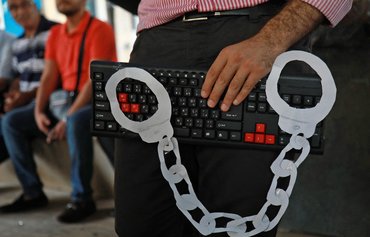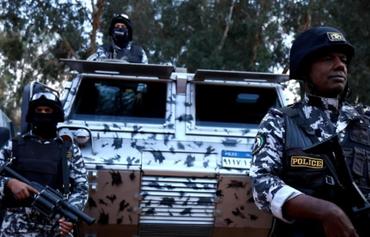BEIRUT -- Lebanese Hizbullah has made repeated threats against a journalist who spoke out against the recent assault on author Salman Rushdie, whose 1988 novel, "The Satanic Verses", sparked the ire of the Iranian regime.
Hadi Matar, 24, a US-born Lebanese-American, repeatedly stabbed Rushdie in the neck and torso as the author was about to deliver a lecture at the Chautauqua Institution in New York state on August 12.
On August 13, Lebanese journalist Dima Sadeq, a critic of Hizbullah, tweeted a collage of portraits of Islamic Republic founder Rouhollah Khomeini and the late Islamic Revolutionary Guard Corps Quds Force (IRGC-QF) commander Qassem Soleimani, which she captioned "The Satanic Verses".
Khomeini had accused Rushdie of "blasphemy", and in 1989 issued a fatwa calling for his death.
![Journalist Dima Sadeq has received threats from Hizbullah elements for posting this collage portraying Islamic Republic founder Rouhollah Khomeini and the late Islamic Revolutionary Guard Corps Quds Force commander Qassem Soleimani on Twitter on August 13 and captioning it 'The Satanic Verses'. [Dima Sadeq/Twitter]](/cnmi_am/images/2022/08/30/36826-sadeq-Twitter-collage-600_384.jpg)
Journalist Dima Sadeq has received threats from Hizbullah elements for posting this collage portraying Islamic Republic founder Rouhollah Khomeini and the late Islamic Revolutionary Guard Corps Quds Force commander Qassem Soleimani on Twitter on August 13 and captioning it 'The Satanic Verses'. [Dima Sadeq/Twitter]
Sadeq said she has received a wave of threats of rape and of violence against her on social media since sharing her post.
Hizbullah member Jawad Nasrallah, son of party leader Hassan Nasrallah, targeted Sadeq directly – sharing her tweet and accusing her of being a "tool" of foreign governments, Reporters Without Borders (RSF) said.
In recent years, Hizbullah has sued a number of journalists who oppose it, including Sadeq, for accusing the party of assassinating anti-Hizbullah activist Lokman Slim.
Attacks on journalists critical of Hizbullah have been on the rise since late 2019, with observers saying they have noticed a decline in freedom of speech and of the press in Lebanon.
Threats against journalists
Journalists opposed to Hizbullah say they will not be intimidated by the party's campaigns to silence them and will continue to expose its destabilising actions in Lebanon.
Following the threats she received, Sadeq tweeted that she was being "subjected to a campaign of incitement that has reached the point of openly calling for bloodshed".
"I ask that this tweet be considered as informing the Lebanese authorities [of these threats]. I also publicly and officially hold Hizbullah's leadership fully responsible for any harm that may now happen to me," she wrote.
Bloomberg news photographer Hassan Shaaban, who has been documenting the protests of fellow Beit Yahoun residents against severe water shortages, has been the target of Hizbullah's attacks.
On Facebook in August, Shaaban said he had found a bullet inside his car and a note on his car that said, "Leave the village, you traitor, you dog".
Journalism organisations such as RSF and the Lebanese Alternative Press Syndicate (APS) have condemned the threats against Sadeq and Shaaban.
The APS blamed Hizbullah for threats on Sadeq's life, and called on Lebanese officials to protect media professionals.
'Repugnant' fatwa
Khomeini's 33-year-old fatwa against Rushdie is "repugnant", religious scholar Sheikh Muhammad Ali al-Hajj al-Ameli told Al-Mashareq.
Neither top Shia cleric Ali al-Sistani, the supreme religious authority in Najaf, nor others before him have ever issued fatwas ordering bloodshed over accusations of blasphemy, he said.
"Rushdie's book ['The Satanic Verses'] does not deserve all the uproar or the fatwa," he said.
"It would have been more worthwhile for religious scholars to examine the widely disseminated texts that are offensive to Islam and the Prophet [Mohammad] in our modern history books."
Freedom of expression requires respecting others' opinions, regardless of their belief or religion, he added.
Writer Youssef Mortada expressed his faith in "absolute freedom of expression".
Threats against Sadeq and Shaaban are the dangerous and shameful acts of those who do not accept criticism, and are a violation of freedom, he told Al-Mashareq.
He urged Hizbullah to respond to Sadeq with arguments instead of threats of physical harm, noting that such threats only reflect the party's fear.
'Hizbullah in crisis'
Hizbullah's threats against journalists demonstrate the crisis it is in, and its fear of losing followers who have started to distance themselves from it, said Mortada.
The death threats made against Sadeq are "unacceptable", political writer and journalist Asaad Bishara told Al-Mashareq.
Unfortunately, Lebanese authorities had no official response, he said, noting that this silence signifies that freedom of expression in Lebanon is in peril.
Bishara called on the judiciary to take immediate action and hold those who made the threats on social media to account, "particularly since their identities are known". The judiciary must not stay silent on the matter, he said.
Threats against journalists and political activists are expressions of hate speech, attempts to restrict freedom, and violations of the Lebanese constitution, said Roula Mikhael, executive director of the Beirut-based Maharat Foundation.
Hizbullah is subjecting a number of female journalists and activists to hate speech, discrimination and defamation campaigns, a clear sign of its systematic violence against women in politics, she added.

![Photographer Hassan Shaaban, who has received threats from Hizbullah, posted a photo of a note left on his car in August, which reads 'Leave the village, you traitor, you dog.' [Hassan Shaaban/Facebook]](/cnmi_am/images/2022/08/30/36781-hizbullah-threat-vehicle-600_384.jpg)






